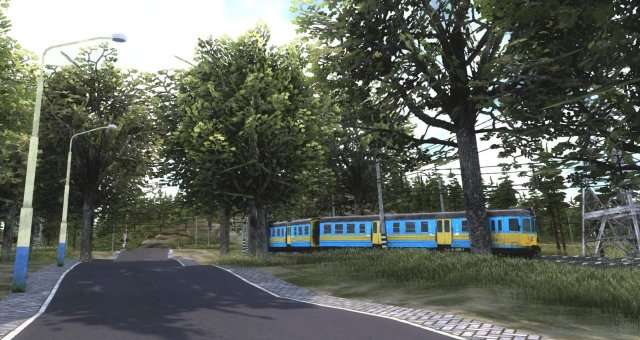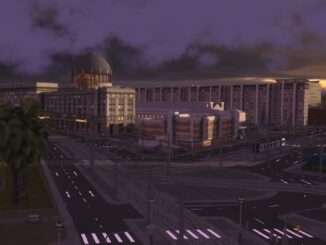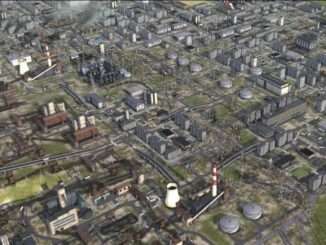
Other W&R Guides:
- Gameplay Tips & Tricks.
- Resource Flow Chart.
- Settings for Signals & Tracks on Largest Custom House.
A beginners guide to Workers and Resources. A walkthrough of the map, basics, and help getting set up with your first socialist town producing electricity. Finding it difficult adjusting to the steep learning curve? This guide will lead you through the basics and get you set up and enjoying the game.
The Basics
Workers and Resources is an open ended city building, planned economy game. There are no real objectives or win conditions other than ones you set yourself. Most players aim to build a working modern socialist country, contructing whole industries for various resources from scratch to serve theier growing population and eventually become self sufficent without having to buy everything in from abroad.
The Map
Firstly the map. This is a square region of land with features such as rivers, mountains, forests and hills. There are two basic map settings. Populated or unpopulated. If you choose populated (which I recommend), there will be a number of existing small villages and towns usually with a church at the centre and with small roads connecting them throughout the country. These towns are essentially dormant until you build near them, so you won’t need to worry about the population needs until then. Neither roads nor towns exist on the unpopulated map.
Two edges of the map border the Soviet Union, and the opposite two border a NATO (western, capitalist) country. This is marked by either red stars at the border for the former, or blue NATO stars for the latter. There are a number of connections to these countries on the border and will comprise of a combination of either road, rail or power connections.
Money
There are two currencies in the game, Rubles and Dollars. The Soviet Union trades exclusively in Rubles and NATO exclusively in Dollars. You can purchase buildings, roads and resources with either currency, but you can’t directly convert the two.
You can also buy vehicles and machines with either currency, although due to trade restrictions with western nations, the vehicle choice is far lower and non-existant for many types of vehicles when paying in Dollars. Therefore you’ll end up purchasing most vehicles in Rubles making them more useful than Dollars overall.
Getting Started – Choosing Your Site
The best way to learn the mechanics is to dive right in and get a small model socialist town and industry set up, so that’s what we’ll do!
At the start of the game, you’ll need to buy the construction of almost everything using your currency reserves, rather than building them yourself using your own workers and resources as you don’t have a construction industry in your country yet.
Your first priority should be to electrify your glorious socialist republic and bring power to the masses (with a little spare to sell). To begin, you’ll need to choose a good site for your first model town. An area near a border connection (usually the Soviet border) is a good starting site, as you’ll need to temporarily import power to get set up, and later, start exporting power and goods.
It’s also good to choose a site close to a coal deposit, as you’ll need a coal burning power plant to begin to produce your own electricity and stop wasting money importing it. To do this, select a coal mine in the build menu and move it over the ground. You’ll see the dots around the mine turn green over coal deposits. The more green, the better the quality of the mining site. Build the mine (you may need to flatten ground around it a little). Building outlines will be red if you can’t place it there, yellow if you need to flatten the land first and green if its OK to build. Read the tool tips that pop up when trying to build. Now connect it by road to a relatively flat site where you will house workers and build a town. You’ll need some good space between the coal plant and the town to fit in your coal industry and powerplant.
It may be worth flattening the area to help in placing buildings. This can be done using the level area button at the top of the construction window. This is quite costly, but we’ll look at a way to make it free at a later date by using your own bulldozers.
People and Facilities
Now time to construct a town. You’ll need to place a few residential buildings along a road and put a small shopping centre (or a grocery and small store), a kindergarten, school, football/soccer field and pub nearby to cater for their needs.
Meeting your citizen’s needs is important otherwise they will work slower and eventually leave. It’s important to make sure the housing is close to these facilities so that residents can walk to them or they won’t be able to use them. Build footpaths (in the roads menu) from the small blue connectors on the buildings to link them to the roads and the facilities. Workers will only walk along roads and footpaths and won’t walk over grass to get where they want to go.
Electricity Supply
Now you need to set up your electricity supply. Many buildings require electricity to function, and you’ll need it initially to set up your own electricity industry. Run a high voltage power line from a border power connection to nearby your settlement. Build a power transformer near to the end of the line. Now connect the line to the power transformer with more high power line. You should be able to run a connection to the big yellow triangles.
Next, place a substation (listed under medium wires) close to your town. When you place the substation you should be able to see yellow lines connecting all buildings. This is how far the electricity reaches from the substation. Make sure the substation is close enough to power all the buildings in your town. Then connect the substation to the small yellow triangles on the power transformer using medium power wires.
Click on the border connection and set to import a small amount of power. Your buildings should now be powered using imported electricity! You may need to repeat this process to ensure the mine is powered too.
Moving Your Workers
Now you need to get your workers to the mine. If they can’t walk there (most likely not as the mine will be in the hills), they’ll need a bus to take them there. Build a small bus depot near your houses, so that workers can walk to it. Don’t forget to connect with pathways. The bus depot also needs to be connected by road and have power.
Workers will gather at the depot waiting for a bus to take them to a work site. However, you don’t have any busses yet! To buy a bus, build a vehicle depot somewhere just outside of town. Here, you can buy vehicles of any kind. Click to purchase (using Rubles) and choose a bus. Vehicles have different stats, speed, passengers etc. Choose a basic high passenger bus for now. Once purchased the bus will be visible in the depot. You’ll also need a place for your busses to fill up, so place a gas station nearby. Vehicles will automatically fill up when low on fuel, if a gas station is nearby and powered.
You’ll need to set up a route for the bus to take workers to your mine to work. Click the bus, and the plus button and select the bus depot as the first stop, click plus again and click the mine. Now your route is set up! Click start and the bus will start it’s route picking up workers from the bus depot and transporting them to the mine. You will probably need more than one bus to service the mine, so go ahead and purchase another and set up its route as before.
Processing Coal
Now you have a functioning coal mine, you’ll need to process the coal ore it produces into usable coal. You do this with a coal processing plant, build this not too far from your mine, make sure it’s powered (you can click the building and see if it has power) and set up a new bus route to bring it workers. You now need a way to move your coal ore to the plant for processing. You can do this one of two ways. Either buy a couple of dumper trucks from the vehicle depot (make sure to check how much coal they can carry! Different vehicles can carry different resources and different amounts) and assign them a route from the mine to the processing plant, in the same way you assigned a bus route. This is quite inefficient, as the dumper trucks can only carry so much and take time to load and unload.
The more efficient way is to build a conveyor line to your plant to move coal ore there directly and quickly. To do this, click on conveyors in the infrastructure tab. You’ll see a green arrow on your mine and on the processing plant. Conveyors connect buildings directly via these arrows. If you can’t draw a conveyor directly from the mine output to the processing plant input (too far, or too sharp an angle), you’ll need to build a conveyor engine/transfer or two as an intermediary station for your conveyors to connect to. These link up conveyor lines and allow you to build conveyor lines longer and in different directions. You may have to fiddle around with the placement of these, conveyors and roads to get them to connect and work. These also need to be powered.
Once connected, your coal processing plant should now receive a steady stream of coal ore via the conveyor belt and begin producing coal. Coal is an important resource and is used for a variety of industries, from making bricks and steel, to powering your powerplants. You’ll now need a place to store all this coal your making. Build an aggregate storage and connect it via conveyor to your coal processing plant. Different types of storage hold different resources, as coal can’t be stacked it piles up in your aggregate storage facilities. Your storage should now be filling up with coal.
Generating Your Own Power
Now, you’re currently powering everything using imported power, which is costing you money every day. Let’s become energy self-sufficient and build a working powerplant. Place your powerplant near the coal processing plant and connect it by road and conveyor to the aggregate storage to pick up coal. Bus in some workers and it it will start producing power. You can hook up your powerplant to the electric grid by replacing the connection from your power transformer to the border station with a connection to your powerplant instead. Cancel the importing of power from the border station and bask in the warm glow of your self-produced, centrally planned, socialist electricity!
You may now want to connect your power plant to a border station and this time export your electricity for a nice income of Rubles (or Dollars). This will help offset the cost of importing all the things your citizens need such as food, clothes, alcohol and electronics until you can set up production and distribution lines for these things yourself.
Where to Go Next?
From here, you can choose a number of different paths, set up an oil industry, steel industry or agriculture. Bear in mind, some industries use special connecting roads instead of conveyor belts to transfer goods from one factory to the next, and some you may need to default back to using trucks to transport the goods. Some buildings require you to purchase machines (such as the excavator for the gravel quarry, or tractors, harvesters and trucks for the farms).
You can also build rail to transport workers and goods. This is a bigger undertaking and requires you to set up a train depot, fuelling station and train stations to pick up and drop off workers and resources, but transports these in large numbers. Even if you plan to eventually become self-sufficient, you will most likely need to export goods for an income as the starting money won’t last forever. This should be a priority early on. Steel and oil (and oil products like fuel and bitumen) are good exports and should be an early focus. You can export these by setting a truck or train to pick up resources and drop them off at a border connection. If you export to a Soviet border connection you get Roubles, and at a NATO connection you receive Dollars for your exports.
Another thing to consider when you have a healthy flow of income is to set up your own construction industry. Early on, you can build a construction office and purchase some Stalin bulldozers. You can now level land for free, as long as it is within distance of the bulldozers, and you ensure that the option to purchase with Roubles/Dollars is turned off in the construction window when levelling.
You’ll then need to set up industries for gravel, asphalt, concrete, prefab panels and other building materials, buy more machines such as the cement mixer and roller at the construction office and set where they get their resources from to be able to assign them to construction projects (where you click to build something but turn off purchase with Roubles/Dollars in the construction window). Constructing it yourself means that you won’t spend any money to build buildings, roads and railways and you have the pride of it being entirely constructed by your own people!
Feel free to use existing towns as sources of population for your industries to save money building houses and importing workers, although you’ll still need to provide them with power and facilities and transport them to their workplace.





Be the first to comment